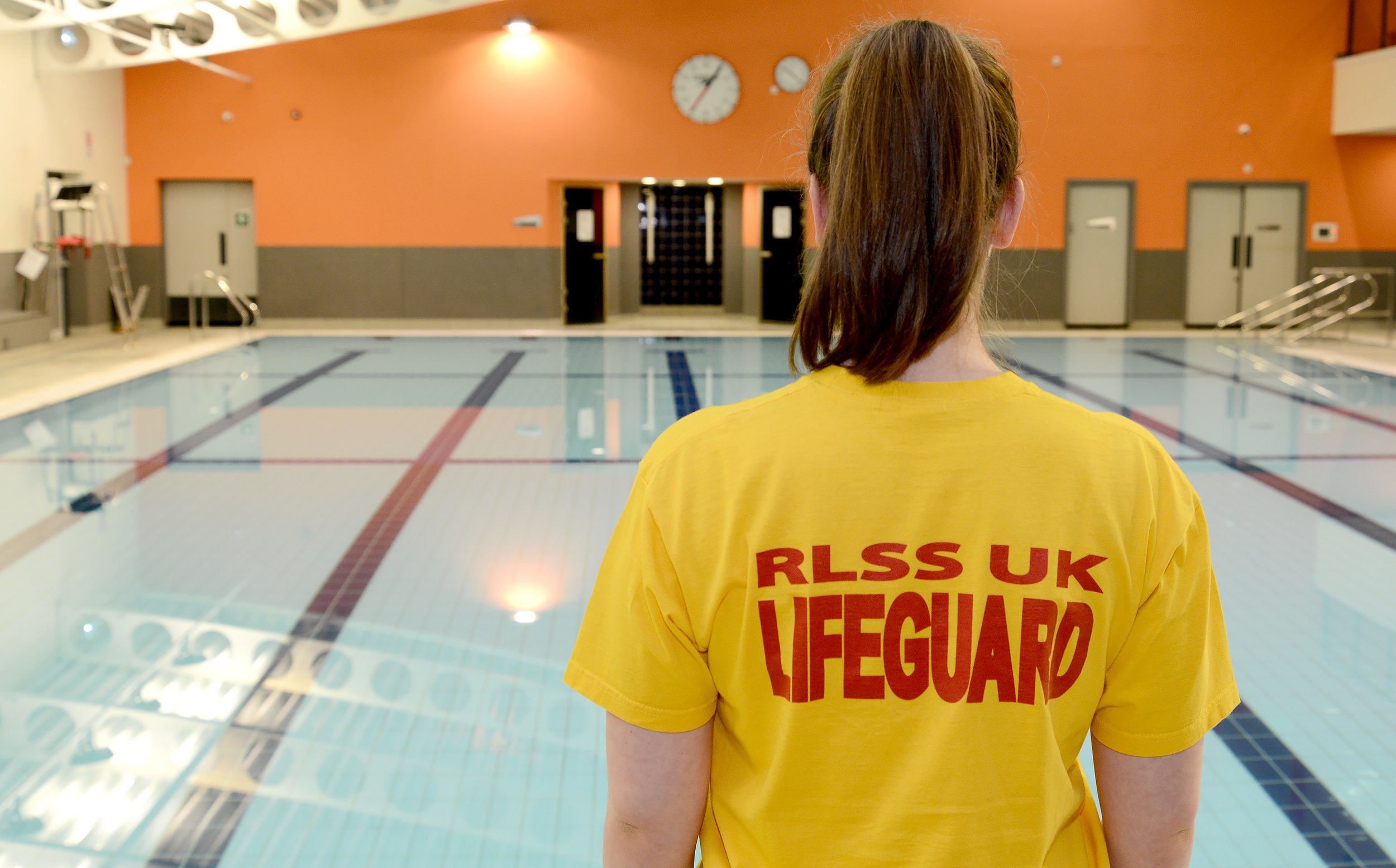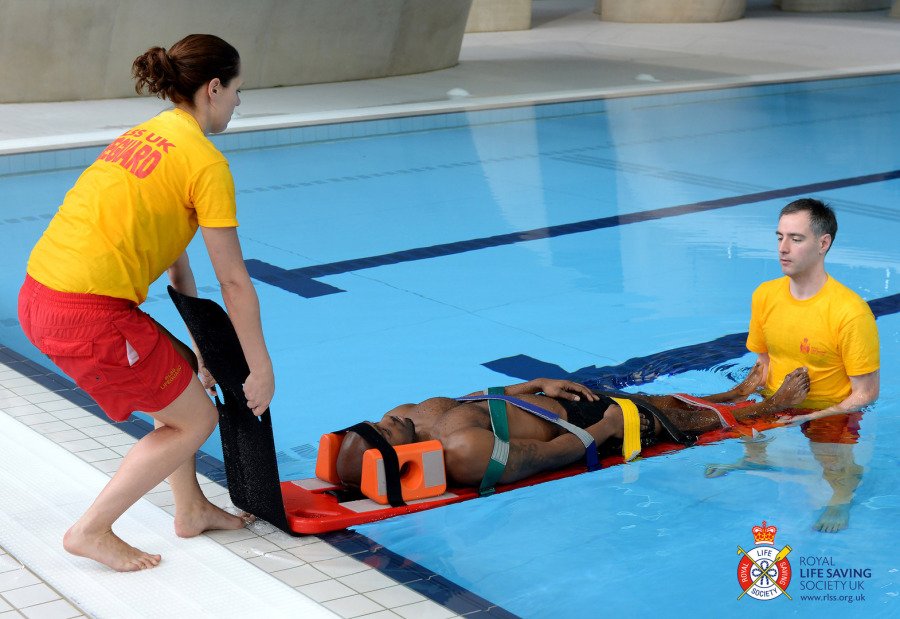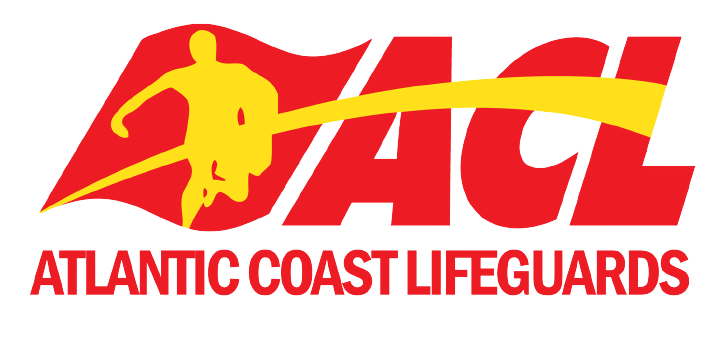
Pool Lifeguard
The Royal Lifesaving Society (RLSS) National Pool Lifeguard Qualification (NPLQ) is the most awarded qualification in Ireland and the UK and is also internationally recognised.
If you would like to work in a swimming pool then this is the qualification for you.
We offer the most up to date Pool Lifeguard qualification in the world. The Gen 10 NPLQ was launched on 04 July 2023.
-
Every candidate attending a National Pool Lifeguard Qualification (NPLQ) course must be 16-years-old or above at the time of taking the NPLQ final assessment and be able to:
Jump/dive into deep water
Swim 50 metres in less than 50 seconds
Swim 100 metres continuously on front and back in deep water
Ability to swim side stroke and inverted breaststroke
Tread water for 30 seconds
Surface dive to the floor of the pool
Climb out unaided without ladder/steps and where the pool design permits
-
The NPLQ covers all elements of Pool Rescue Techniques, Lifeguarding Theory, First Aid and CPR.
The course is physically demanding and will include swimming to set times, lifting casualties and diving to the deepest part of the swimming pool.
Training and assessment for the NPLQ are in three sections, and candidates must successfully pass all to attain the qualification.
-
Assessment for the NPLQ takes place at the end of the course. You can only sit the assessment if you prove competence on the course to the course trainer.
It determines your knowledge and understanding of the principles of working as a pool lifeguard and assesses your ability to apply the skills and knowledge in a work-related environment.
The assessment is split into three sections:
Practical pool assessment
Theory Assessment for all three sections
Practical First Aid & CPR assessment
-
An excellent starting point for a career in the leisure industry
Opportunity for career progression as most leisure managers start as Pool Lifeguards
Varied working hours
Work within a team
The NPLQ is recognised around the world, so potential to work and travel
A great way for students to fund studies
Learn essential life skills, including First Aid and CPR
-
Swimming togs
Shorts and T-shirt to wear in the water
Packed lunch and plenty of snacks
Drinking water
Notepad and pen
A positive attitude
-
New candidates (with no prior history with RLSS UK) will need to create a RLSS UK Account.
Create an account here - https://rlssuk.tahdah.me/account/registernew
Anyone who already has a RLSS UK award, qualification, or RLSS UK Membership only needs to activate their RLSS UK Account using their Society Number.
Your Society Number is on any previous certificate or correspondence from RLSS UK - it begins with a 3.
Please carefully input or check your email address to ensure you receive your account verification email. Verification is the crucial final step.
You can then log in to your RLSS UK Account and access your certificates by clicking on ‘Awards & Training’, then ‘Training’ (from the list), then finally, the green circle with a white arrow to download your certificates.
Any problems, please do not create another account; contact us at customerservices@rlss.org.uk.
-
NPLQ renewal candidates may renew their qualification within the period of validity of their existing qualification as stated on their certificate. This will include a full assessment of lifeguard knowledge and skills by an independent assessor.
Candidates must have access to the most up-to-date copy of ‘The Lifeguard’ manual prior to assessment.
The following is required to be completed by candidates prior to the renewal assessment of their qualification to demonstrate their ongoing professional competence:
20 hours of Continued Professional Development (CPD) within the last two years from the date of the previous assessment covering content from the NPLQ syllabus:
In-water swimming pool rescue skills (at least 4 hrs)
CPR (at least 4 hrs)
First Aid (at least 4 hrs)
Lifeguard theory (at least 4 hours)
Continued Professional Development can be achieved by:
Attendance at Lifeguard ongoing training and competency assessment* (strongly recommended)
Attendance at alternative training, face-to-face or online, relating to In-water swimming pool rescue skills, CPR, First Aid and Lifeguard theory
-
The course is based over two weekends and timetables is subject to change based on pool availability. However we tend to use the following timetable.
Friday - 17.00 - 22.00 online via zoom
Saturday 08.30 - 18.00
Sunday 08.30 - 18.00
Friday - 17.00 - 22.00
Saturday 08.30 - 18.00
Sunday 08.30 - 18.00
This includes exam
Why become a Pool Lifeguard ?
Lifeguards benefit from varied working hours, which can easily fit around other commitments, the experience of working within a team, and the opportunity to progress within the leisure industry - most leisure managers start as pool lifeguards.
You will meet like minded people, work internationally, learn skills for life, a great way to fund studies or a life long career.

FAQs
-
We recommend being able to swim 50 meters in less than 50 seconds front crawl and be able to swim 100 meters non stop.
-
The total qualification time (TQT) for this qualification is 46 hours. This is made up of 36 guided learning hours (GL) (excluding breaks) for the delivery of the qualification and 10 hours for candidate self-study (independent learning) for consolidation and preparation for assessments.
Self-study includes revision questions within the NPLQ candidate manual, theory practice papers and revision reading. It should be set by the trainer but does not need to be recorded.
This also is followed by a 3 hour exam.
-
16 is the minimum age to complete a public pool lifeguard course
-
Accredited national pool lifeguard certificate from Royal Lifesaving Society is valid for 2 years from date of completion of exam.
-
On completion of a course and final assessment you get your certificate immediately via our online portal
-
Goggles are not allowed for health and safety reasons.
-
I am new to RLSS …
If you have never held a RLSS award, qualification or RLSS membership, you do not have an account and will need to create one. Creating your RLSS Account is easy. Just click the link below and, don't forget, shortly after setting up your RLSS UK Account you will receive an email from us asking you to verify your email (check your junk/spam inbox). This is the crucial final step and, then you are good to go!
https://rlssuk.tahdah.me/account/registernew
Health and Safety on Courses:
Due to the nature of the course, candidates are required to be aware of the following:
-
To lift and move candidates from the water as part of a team – correct methods of lifting will be taught but we should be informed of any pre existing injuries prior to the course starting.
The following statement should be read to candidates at the commencement of both training courses and assessments:
“The Society does not support the use of unassisted lifting during training and assessment. You should take note that all casualty lifting carries with it an element of risk.”
-
Ear damage may result from diving to depths greater than 1.5 metres. All candidates must be warned of this prior to training by trainers & prior to assessments by assessors.
The following statement must be read to all candidates:
“YOU SHOULD BE AWARE THAT THERE MAY BE A RISK OF DAMAGE TO YOUR HEARING BY DIVING TO DEPTHS GREATER THAN 1.5 METRES. ALL DIVES ARE UNDERTAKEN AT YOUR OWN RISK”.
Any candidate with a history of ear trouble should not be permitted to dive without previously consulting a medical practitioner. If the minimum depth of water available is greater than the maximum depth laid down in the test conditions, the Assessor will check the candidate can execute a surface dive and swim down to the depth specified in the test conditions to recover a suspended object from the stated depth. NPLQ candidates must recover a submersible manikin.
-
Candidates are advised that Lifesaving, Lifeguarding and Life Support activities involve physical handling and manoeuvring of bodies. Jewellery which may cause damage must be removed on the instructions of the Trainer or Assessor.


